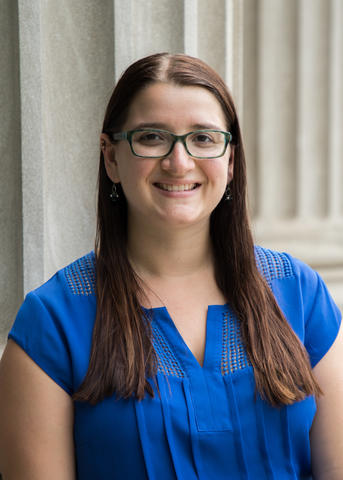
Jessica Froula
E-MAIL: [email protected]
PhD 2024
PhD Thesis
Contributions of CA1 inhibitory interneurons to cerebello-hippocampal communication
Undergraduate Institution and Major:
Birmingham-Southern College, B.S. in Bio-Psycology, 2016
Graduate Research:
The cerebellum is often thought of as a motor control center, but it also participates in non-motor functions such as spatial navigation and cognition. My thesis research is focused on exploring the connectivity that the cerebellum has with the rest of the brain that allows it to play a role in non-motor functions. One target region of interest is the hippocampus, a region with which the cerebellum has no direct projections, yet direct modulation of the cerebellum has been shown to have a powerful effect on hippocampal activity. To study these topics, some of the techniques I am using include AAVs, slice electrophysiology, optogenetics, and wide-field calcium imaging.
Graduate Publications
The cerebellum's understated role and influences in the epilepsies. Neurobiol Dis. 2023 May 18:106160.
The little brain and the seahorse: Cerebellar-hippocampal interactions. Front Syst Neurosci. 2023 Mar 23;17:1158492.
Graduate Awards/Honors:
- Poster Award at Institute for Translational Neuroscience/MnDRIVE BrainConditions Research Retreat, 2024
- Council of Graduate Students Career Development Grant Award, 2023
- 2020-2021 MnDRIVE Research Fellowship in Neuromodulation
Graduate Advisor:
Esther Krook-Magnuson, Ph.D., Department of Neuroscience
Rotations:
Michael Lee, Ph.D., Department of Neuroscience
Catherine Kotz, Ph.D., Departments of Geriatric Research, Education and Clinical Care (GRECC); Food Science and Nutrition; MN Obesity Center
Esther Krook-Magnuson, Ph.D., Department of Neuroscience
Ling Li, DVM, Ph.D., Department of Experimental and Clinical Pharmacology
GPN Committees:
GPN Student Board, 2019-2020
Undergraduate or Post-Bac Research:
Post-Bac:
After graduation, I worked as a technician studying how different molecular conformations of alpha-synuclein could affect pathology and toxicity in Parkinson's Disease.
Undergraduate:
As an undergraduate, I primarily worked in a lab studying over-expression of the Klotho protein in a mouse model.
Publications:
Post-Bac:
- Froula JM, Castellana-Cruz M, Anabtawi NM, Camino JD, Chen SW, Thrasher DR, Freire J, Yazdi AA, Fleming S, Dobson CM, Kumita JR, Cremades N, Volpicelli-Daley LA. Defining α-synuclein species responsible for Parkinson's disease phenotypes in mice. J Biol Chem. 2019; 294(27):10392-10406.
- Froula JM, Henderson BW, Gonzalez JC, Vaden JH, Mclean JW, Wu Y, Banumurthy G, Overstreet-Wadiche L, Herskowitz JH, Volpicelli-Daley LA. α-Synuclein fibril-induced paradoxical structural and functional defects in hippocampal neurons. Acta Neuropathol Commun. 2018 May 1;6(1):35.
- Polinski NK, Volpicelli-Daley LA, Sortwell CE, Luk KC, Cremades N, Gottler LM, Froula J, Duffy MF, Lee VMY, Martinez TN, Dave KD. Best practices for generating and using alpha-synuclein pre-formed fibrils to model Parkinson's disease in rodents. J Parkinsons Dis. 2018;8(2):303-322.
Undergraduate:
- Effect of Klotho overexpression in the hippocampus of a mouse model. Senior Thesis Paper; BSC; Birmingham, AL, 2016.
- Is Exclusion's Influence on Risk-taking Moderated by Reward Type? Kristin N. Meyer; Jessica M Froula; Sean J. McCarthy (Lynne Trench, Faculty Sponsor) Poster; Midwestern Psychological Association Conference; Chicago, IL, 2015.
Undergraduate Awards:
Phi Beta Kappa, April 2016
Dean’s List 2013-2016
What Got You Interested In Research?
I first got interested in research while I was working at a summer camp for kids on the Autism Spectrum. I wanted to learn more about why each person exhibited such different behavior and varying levels of obstacles to social interaction. This was in high school, so I started looking for colleges where I could study neuroscience and first got involved in research as part of a summer program.
Why Did You Choose MN?
There is a great community of people here who are so excited to help you succeed! Additionally, the wide variety of faculty labs provide for a ton of topics for Ph.D. research.
Student Mentor and the Best Advice They Gave:
Reshma Gore. She gave me some great advice about setting up rotations for my first year.
Favorite Itasca Memory:
One of my favorite Itasca memories is when we all got to make s’mores and play the Werewolf game with the second years around the campfire.
